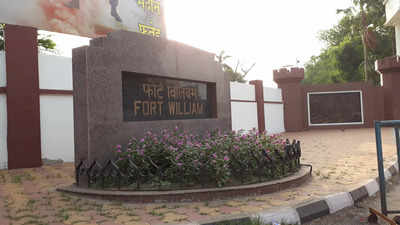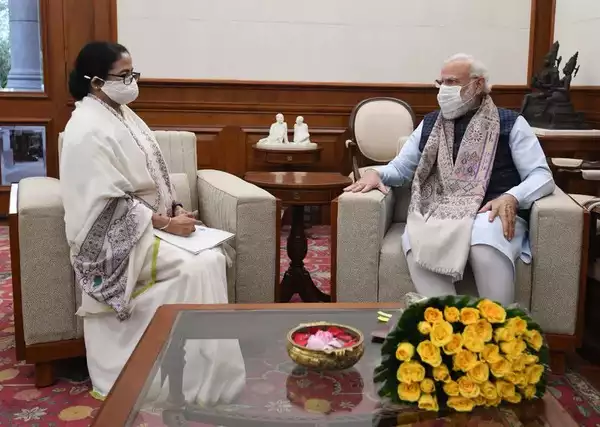“Baire theke Borgi aashe,
Niyom kore proti maashe,
Ami o achi, tumi o robe,
Bondhu ebar khela hobe.”
(“The Borgis come from outside, every month without fail. But I’m here, and you’ll stay. Friend, now it’s time for the game to begin.”)
In the charged political atmosphere of Bengal, history isn’t just remembered—it is wielded as a weapon. During the 2021 West Bengal elections, the viral political song Khela Hobe—penned by TMC’s Debangshu Bhattacharya—shrewdly framed the BJP as outsiders, drawing a direct parallel between the Maratha plunderers (Borgis) and BJP campaigners from the Hindi belt. The message was clear: Bengal had suffered the wrath of ‘outsiders’ before, and it would not let history repeat itself.
Now, in 2025, history has come full circle. The Indian Army’s decision to rename Fort William—the bastion of its Eastern Command in Kolkata—to
Vijay Durg
might seem innocuous to non-Bengalis, but in West Bengal, it could stir up a hornet’s nest.
What was meant to be a symbolic step towards decolonisation could instead reopen centuries-old wounds. While the government’s intent may have been to honour Indian military heritage over colonial relics, to the average Bengali, this renaming isn’t just about shaking off British rule—it feels like rubbing salt into an old wound inflicted by the Marathas.
By rechristening a fortress of British power with the name of a Maratha stronghold, the BJP might have unwittingly handed Mamata Banerjee and the Trinamool Congress (TMC) a potent electoral weapon—one rooted in historical grievance and Bengali identity politics.
Decolonisation or Historical Insensitivity?
Renaming colonial-era institutions is a politically lucrative move. It aligns perfectly with the BJP’s ‘Azadi Ka Amrit Mahotsav’ narrative—erasing British influences while glorifying ‘indigenous’ history. From the renaming of Rajpath to Kartavya Path to the overhaul of military regiments, the government has pursued a clear agenda: India must reclaim its past from its colonial overlords.
But history is not a monolith, and decolonisation isn’t one-size-fits-all. A name that resonates with pride in Maharashtra might not evoke the same sentiment in Bengal.
Context matters. And in Bengal, the name Vijay Durg is not an emblem of resistance—it is a historical landmine waiting to explode.
The Borgi Invasions: A Chapter of Terror
To understand why this renaming is bound to be incendiary, one must revisit a chapter of history that still haunts Bengal’s cultural memory—the Borgi invasions (1741–1751).
The Marathas, led by Raghoji Bhonsle and his generals, launched a decade-long campaign of terror into Bengal. The official pretext was to extract chauth—a form of tribute—but in practice, it was merciless plunder. The Borgis (Maratha raiders) swept through the villages like an unstoppable force of devastation—burning homes, looting granaries, raping women, castrating men, and enslaving children.
The havoc they wreaked was so immense that Alivardi Khan, the Nawab of Bengal, was forced to restructure the province’s entire defensive strategy. After ten years of relentless warfare, he finally pushed them back—but Bengal was left battered, its economy crippled, and its people traumatised.
Unlike many other historical invasions, the Borgi raids did not simply fade into obscurity. The memory of those terrifying years was woven into Bengali folklore. Even today, Bengali mothers invoke the Borgi as a bogeyman to frighten their children into obedience.
A famous folk song from the era remains etched in cultural consciousness:
“Khoka ghumalo, para juralo, borgi elo deshe,
Bulbulite dhan kheyechhe, khajna debo kise?”
(“The baby sleeps, the village quiets, but the Borgis have arrived. The sparrows have eaten the grains; how will we pay the tax?”)
This isn’t just history—this is generational trauma. And trauma has a long memory.
A Political Own Goal?
For a party that has struggled to gain deep inroads in Bengal, this renaming is nothing short of a strategic blunder. The TMC will undoubtedly capitalise on this moment, using it to reinforce its Bangali Asmita (Bengali identity) narrative.
With Bengal’s assembly elections set for 2026, the timing of this renaming could not have been worse for the BJP. It hands the TMC a fresh rallying point, allowing Mamata Banerjee to frame the BJP as outsiders yet again, an issue that helped her decimate the saffron party in the 2021 state elections.
Mamata Banerjee will now have the perfect opportunity to ask:
- Why honour the Marathas in Bengal, when their historical role in the state was one of terror?
- If we must rename
Fort William , why not after NetajiSubhas Chandra Bose , a true son of Bengal? - Why should a city that bears the scars of the Borgis now pay homage to their legacy?
For the BJP, these are difficult questions to answer.
Bengal’s Own Heroes: The Alternative That Was Ignored
Bengal has never subscribed to the idea of one overarching hero, one god, or one ruler. Hinduism itself, in its vast complexity, resists uniformity. Unlike monotheistic traditions, it thrives on diversity—multiple gods, multiple texts, multiple philosophies, and multiple paths to salvation. By extension,
Hindutva
’s attempt to impose a singular historical narrative, centred on a handful of chosen figures, clashes with Bengal’s deeply rooted pluralism.
If the idea was to honour India’s maritime legacy, why not look closer to home?
Bengal had its own naval rulers, figures like Shashanka, the first recorded independent king of Bengal, who ruled in the 7th century and maintained a formidable naval force. The Palas, too, had a strong naval presence that extended to Southeast Asia. Even in the medieval period, Bengal’s ports, like Tamralipta and Saptagram, played a crucial role in trade and maritime defence.
If Fort William had to be renamed, why not choose a name tied to Bengal’s own naval history, rather than glorifying an invading force?
Rather than erasing a colonial shadow, the new name casts a darker, more divisive one—one that revives painful memories rather than fostering pride. And with the 2026 Bengal elections on the horizon, where every cultural symbol becomes a battleground, this renaming might have just handed Mamata Banerjee a very loose ball.




